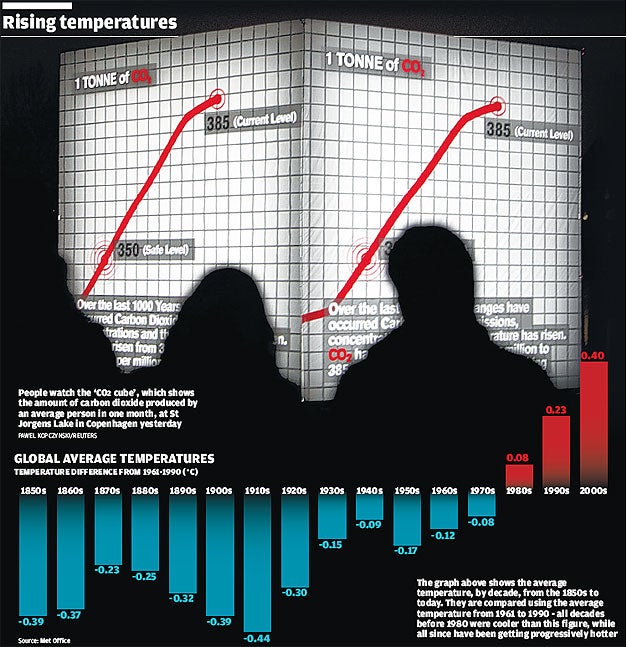Met Office reveals last decade was the hottest ever recorded
Data show that Earth is not cooling as some sceptics had claimed, but is hotter now than at any point since 186

Your support helps us to tell the story
From reproductive rights to climate change to Big Tech, The Independent is on the ground when the story is developing. Whether it's investigating the financials of Elon Musk's pro-Trump PAC or producing our latest documentary, 'The A Word', which shines a light on the American women fighting for reproductive rights, we know how important it is to parse out the facts from the messaging.
At such a critical moment in US history, we need reporters on the ground. Your donation allows us to keep sending journalists to speak to both sides of the story.
The Independent is trusted by Americans across the entire political spectrum. And unlike many other quality news outlets, we choose not to lock Americans out of our reporting and analysis with paywalls. We believe quality journalism should be available to everyone, paid for by those who can afford it.
Your support makes all the difference.The first decade of this century has been by far the warmest on record, the World Meteorological Organisation (WMO) and the UK Met Office announced yesterday - and this year is likely to have been the fifth hottest.
At the UN Climate Conference in Copenhagen, officials from both organisations said the new figures showed that the world was not in a cooling phase, as some sceptics have asserted, but that the warming trend seen for the past 40 years was continuing.
The 10 years up to the end of 2009 have been the hottest in the 160-year instrumental record of global temperatures, and significantly warmer than the 1990s, the 1980s or any other decade since global surface temperature measurements began in 1860, the WMO and the Met Office said in separate announcements at the meeting, where the world community is trying to construct a new global warming treaty.
Taken as a whole, the first decade of the 21st century has been 0.4 degrees hotter than the current baseline for measuring global temperatures – the average for the years 1961-1990, which was 14C. By comparison, the 1990s were 0.23 degrees hotter and the 1980s were 0.08 degrees hotter, while all the previous decades stretching back to 1850 showed averages that were lower.
"This is an indication that the world has not been cooling since 1998," said Dr Vicky Pope of the Met Office's Hadley Centre for Climate Prediction and Research, referring to claims by climate change sceptics that since 1998, the hottest year of all, the trend has changed from warming to cooling.
"We are in a warming trend, we have no doubt about that," said Michel Jarraud, secretary general of the Geneva-based WMO. Both organisations also revealed that, although the final data is not yet in, 2009 is likely to turn out to be the fifth warmest individual year since records began, up from the comparatively cooler 2008 - which, influenced by the La Niña cold-water weather phenomenon in the Pacific, was 11th in the record.
The La Niña has now been replaced by its opposite, an El Niño, where a periodic warming of the waters of the eastern tropical Pacific off the coast of South America affects temperatures and weather patterns across the world. The current El Niño is partly responsible for the warmer 2009, and some meteorological scientists are already canvassing the possibility that it may make 2010 a new record-breaker.
Although 2009 is likely to be fifth, the WMO announced yesterday that in some regions of the world it had been much hotter.
"In large parts of southern Asia and of central Africa, it is likely to be the warmest ever on record," said Mr Jarraud.
With an irony of global proportions - at least in terms of arguments over climate change – the only region where below-average temperatures were recorded this year was North America and Canada, where scepticism about climate change is most entrenched.
Yesterday, a draft version of a possible Copenhagen agreement emerged. Known as the "Danish text", the draft was drawn up by a group of rich industrialised countries including Britain, the US and the host country, Denmark.
Although it is now two weeks old and has been superseded by the negotiations, the document does show what the outlines of an accord might look like - if all parties can agree to it.
It would commit all the countries of the world, in an overall "shared vision", to strive to limit global warming to 2C by halving global emissions of CO2 by 2050 – so far only the industrialised countries have done this. The agreement would insist upon all developed countries having binding national targets to cut their emissions.
To help the developing countries, a new international Climate Fund would be set up, which would replace the several different streams of aid now available to help the poorer countries fight global warming. Crucially for them, the text says that the funds would be "new and additional" resources - implying that existing aid for health and education, say, would not be diverted into windfarms. It is understood that China and some of the other developing countries have put forward an alternative draft.
Join our commenting forum
Join thought-provoking conversations, follow other Independent readers and see their replies
Comments